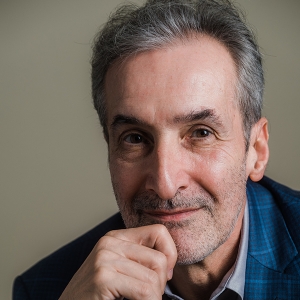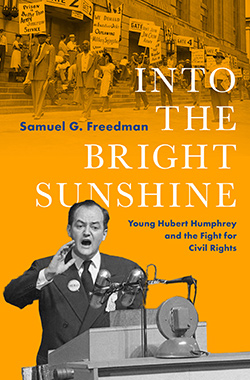2024 Hillman Prize for Book Journalism

Samuel G. Freedman
 During one sweltering week in July, 1948, the Democratic Party gathered in Philadelphia for its national convention. The most pressing and controversial issue facing the delegates was not who to nominate for president—the incumbent Harry Truman, was the presumptive candidate—but whether the Democrats would finally embrace the cause of civil rights and embed it in their official platform.
During one sweltering week in July, 1948, the Democratic Party gathered in Philadelphia for its national convention. The most pressing and controversial issue facing the delegates was not who to nominate for president—the incumbent Harry Truman, was the presumptive candidate—but whether the Democrats would finally embrace the cause of civil rights and embed it in their official platform.
Even under Franklin Roosevelt, the party had dodged the issue in order to keep a bloc of Southern segregationists, the-so-called-Dixiecrats, in the New Deal coalition. On the convention’s final day, Hubert Humphrey, just 37 and the relatively obscure mayor of the mid-sized city of Minneapolis, ascended the podium. Defying Truman’s own desire to occupy the middle ground, Humphrey urged the delegates to “get out of the shadow of states’ rights and walk forthrightly into the bright sunshine of human rights.” Humphrey’s speech put everything on the line, rhetorically and politically, to move the party, and the country, forward.
To the surprise of many, including Humphrey himself, the delegates responded to his speech with a roaring ovation (and cries of outrage from the Southerners), and voted to adopt a meaningful civil-rights plank. With no choice but to run on it, Truman seized the opportunity, desegregating the armed forces and, in November, upsetting frontrunner Thomas Dewey. It was a victory due, in part, to an unprecedented surge of Black voters.
That week shapes American politics to this day. Humphrey’s journey to his pivotal speech runs from a remote, all-white hamlet in South Dakota to the mayoralty of Minneapolis—where he tackled the city’s notorious racism and anti-Semitism—to his role as a national champion of multiracial democracy. His allies included a Black newspaper publisher, a Jewish attorney, and a professor who had fled Nazi Germany. And his adversaries were white supremacists, Christian nationalists, and America Firsters of mid-century America—one of whom tried to assassinate him.
The book celebrates one of the overlooked landmarks of civil rights history without succumbing to the white savior fallacy.
Humphrey’s legacy is tarnished by his support of an indefensible war in Vietnam. Into the Bright Sunshine compels us to remember a different side of the man, as a trailblazer who helped propel our nation towards true multiracial democracy.
Samuel G. Freedman is a tenured professor at the Columbia University Graduate School of Journalism and the author of the ten acclaimed books including Small Victories: The Real World of a Teacher, Her Students and Their High School (1990); Upon This Rock: The Miracles of a Black Church (1993); The Inheritance: How Three Families and America Moved from Roosevelt to Reagan and Beyond (1996); Jew vs. Jew: The Struggle for the Soul of American Jewry (2000); Who She Was: My Search for My Mother’s Life (2005); Letters To A Young Journalist (2006); and Breaking The Line: The Season in Black College Football That Transformed the Game and Changed the Course of Civil Rights (2013).
With his colleague Kerry Donahue, Freedman co-produced a radio documentary and authored a companion book, both entitled Dying Words: The AIDS Reporting of Jeff Schmalz and How it Transformed The New York Times. The documentary and book were released in conjunction with World AIDS Day on December 1, 2015, and since then the documentary has been broadcast on more than 500 NPR member stations. In 2020, Freedman wrote Ma Rainey’s Black Bottom: The Journey From Stage to Screen, the companion book to the film adaptation of August Wilson’s classic play.
Freedman was a staff reporter for The New York Times from 1981 through 1987. From 2004 through 2008, he wrote the paper’s “On Education” column, winning first prize in the Education Writers Association’s annual competition in 2005. From 2006 through 2016, Freedman wrote the “On Religion” column, receiving the Goldziher Prize for Journalists in 2017 for a series of columns about Muslim-Americans that had been published over the preceding six years.
Freedman has contributed to numerous other publications and websites, including The New Yorker, The Washington Post, The Guardian, Daily Beast, New York, Rolling Stone, USA Today, Los Angeles Times, Buzzfeed, Salon, Slate, Chicago Sun-Times, Tablet, The Forward, Ha’aretz, The Undefeated, The Root, and BeliefNet.
Freedman was named the nation’s outstanding journalism educator in 1997 by the Society of Professional Journalists. In 2012, he received Columbia University’s coveted Presidential Award for Outstanding Teaching. Freedman’s class in book-writing has developed more than 110 authors, editors, and agents, and it has been featured in Publishers Weekly and the Christian Science Monitor. He is a board member of the J. Anthony Lukas Book Awards and member of the Journalism Advisory Council of Religion News Service and the faculty advisory board of the Center for Journalism Ethics. He has spoken at the Smithsonian Institution, Yale University, and UCLA, among other venues, and has appeared on National Public Radio, CNN, and the PBS News Hour.
Freedman holds a bachelor’s degree in journalism and history from the University of Wisconsin-Madison, which he received in May 1977. He lives in New York with his wife, Christia Chana Blomquist.

